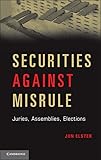Securities against misrule [Texte imprimé] : juries, assemblies, elections / by Jon Elster
نوع المادة : نصتفاصيل النشر:New York : Cambridge University Press, 2013وصف:1 vol. (295 p.) : ill., cartes ; 24 cmتدمك:
نصتفاصيل النشر:New York : Cambridge University Press, 2013وصف:1 vol. (295 p.) : ill., cartes ; 24 cmتدمك:- 978-1-107-03173-9
- 302.3 23E
- 302.3
| نوع المادة | المكتبة الحالية | المجموعة | رقم الطلب | رقم النسخة | حالة | تاريخ الإستحقاق | الباركود | |
|---|---|---|---|---|---|---|---|---|
|
|
Bibliothèque centrale | Collection générale | 302.3 / 499 (إستعراض الرف(يفتح أدناه)) | 1 | المتاح | 000005521579 |
"This book proposes a normative theory of collective decision making, inspired by Jeremy Bentham but not including his utilitarian philosophy. The central proposal is that in designing democratic institutions one should reduce as much as possible the impact of self-interest, passion, prejudice, and bias on the decision makers, and then let the chips fall where they may. There is no independently defined good outcome that institutions can track, nor is there any way of reliably selecting good decision makers. In addition to a long initial chapter that surveys theories of collective decision making, notably social-choice theory, and a chapter expounding and discussing Bentham,Ŵs views, historical chapters on the jury, constituent assemblies, and electoral systems develop and illustrate the main ideas. This work draws on a welter of case studies and historical episodes, from Thucydides and Plutarch to the present. It is also grounded in psychology, behavioral economics, and law"-- Provided by publisher
Bibliogr. p. 289-313
لا توجد تعليقات على هذا العنوان.


